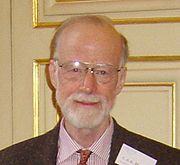- C. A. R. Hoare
-
Sir Charles Antony Richard Hoare (* 11. Januar 1934 in Colombo, Sri Lanka), besser bekannt als Tony Hoare oder C.A.R. Hoare, ist ein britischer Informatiker.
Hoare erlangte hohes Ansehen durch die Entwicklung des Quicksort-Algorithmus sowie des Hoare-Kalküls, mit der sich die Korrektheit von Algorithmen beweisen lässt. Außerdem entwickelte Hoare die Prozessalgebra Communicating Sequential Processes (CSP), die zum Beispiel die Entwicklung der Programmiersprachen Ada und Occam beeinflusst hat.
Inhaltsverzeichnis
Biographie
Hoare wurde in Colombo, Sri Lanka als Sohn britischer Eltern geboren. 1956 beendete er sein humanistisches Studium (Classics) an der Universität Oxford mit Bachelor-Abschluss.
Es folgte ein Jahr Graduiertenstudium in Statistik in Oxford, bevor er an der Moskauer Staatsuniversität computergestützte Übersetzung menschlicher Sprache weiterstudierte. 1960 begann er seine Tätigkeit bei dem kleinen Computerhersteller Elliot Brothers mit der Implementierung von Algol 60 und ersten Algorithmenstudien. 1968 wurde er an der Queen’s University of Belfast habilitiert und kehrte 1977 als Professor der Informatik an die University of Oxford zurück.
Hoare ist heute emeritierter Professor der Universität Oxford und leitender Forscher bei Microsoft Research in Cambridge, England.
Auszeichnungen
- 1980 erhielt er den Turing Award für seine grundlegenden Errungenschaften bei der Definition und Entwicklung von Programmiersprachen.
- 2000 wurde ihm der Kyoto-Preis verliehen.
- 2007 Friedrich-L.-Bauer-Preis für Informatik
Zitate
„I conclude that there are two ways of constructing a software design: One way is to make it so simple that there are obviously no deficiencies and the other way is to make it so complicated that there are no obvious deficiencies.
(Frei übersetzt: Ich stelle fest, dass es zwei Wege gibt, ein Software-Design zu erstellen, entweder so einfach, dass es offensichtlich keine Schwächen hat, oder so kompliziert, dass es keine offensichtlichen Schwächen hat.)“– Tony Hoare, Dankesrede für den Turingpreis 1980 [1]
Eine weitere berühmte Aussage, die als „Hoare's dictum“ bekannt ist:
„Premature optimization is the root of all evil.”
(Zu frühe Optimierung ist die Wurzel allen Übels.)“– Tony Hoare [2]
„I think Quicksort is the only really interesting algorithm that I've ever developed.“
– Tony Hoare [3]
Einzelnachweise
- ↑ [1] PDF-Datei
- ↑ Knuth, Donald. Structured Programming with go to Statements, ACM Journal Computing Surveys, Vol 6, No. 4, Dez. 1974. S.268.
- ↑ Len Shustek. An Interview with C.A.R. Hoare, Communications of the ACM, Vol 52, No 3, March 2009, S.38ff
Literatur
- C. A. R. Hoare: Assertions, A Personal Perspective in M. Broy und E. Denert (Hrsg.): Software Pioneers – Contributions to Software Engineering, Springer 2002 (Die beiliegenden DVDs enthalten ein Video des Vortrags von Tony Hoare), Abstracts und mehr
- C. A. R. Hoare: An Axiomatic Basis for Computer Programming, Communications of the ACM, Vol. 12 (10), 1969, pp. 576-580, 583 (Reprint im o.g. Buch Software Pioneers)
- C. A. R. Hoare: Proof of Correctness of Data Representations, Acta Informatica, Vol. 1, Fasc. 4, 1972, pp. 271-281 (Reprint im o.g. Buch Software Pioneers)
- C. A. R. Hoare: Communicating Sequential Processes, Prentice-Hall, 1985, (PDF-Version)
Weblinks
- Literatur von und über Tony Hoare im Katalog der Deutschen Nationalbibliothek
- Tony Hoare, Oxford University (engl.)
- Kurze Biografie bei Microsoft (englisch)
- The 1980 ACM Turing Award Lecture – Abschrift der Rede von Tony Hoare (archiviert, englisch)
Personendaten NAME Hoare, Tony ALTERNATIVNAMEN Hoare, Charles Antony Richard (voller Name); Hoare, C.A.R. KURZBESCHREIBUNG britischer Informatiker, Entwickler des Quicksort-Algorithmus sowie des Hoarekalküls GEBURTSDATUM 11. Januar 1934 GEBURTSORT Colombo, Sri Lanka
Wikimedia Foundation.

